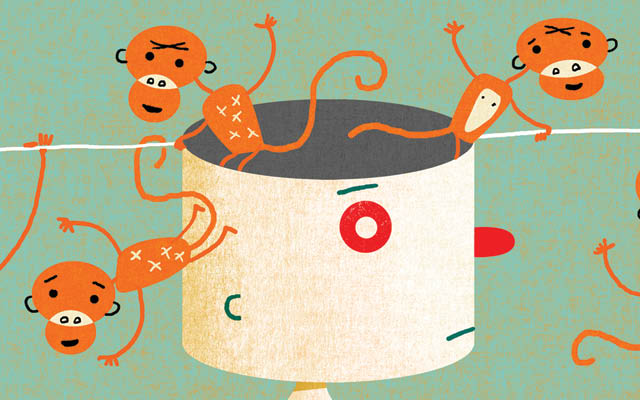Sometimes an unpleasant thought takes hold and won’t let go. No matter what you do to shake it, the same thought keeps clamoring for your attention.
Unlike worry, which typically involves an endless stream of new concerns, rumination presents nothing new. Like animals that chew their cud, we chew on the same few thoughts when we ruminate, as if doing so might help us digest them.
It’s easy to think of rumination as a 3 a.m. problem — and it does often interfere with sleep. But it can also cause trouble for overall mental health. In my practice, I’ve seen rumination play a big role in perpetuating shame, remorse, and judgment. It’s often present in people struggling with addiction issues. And sometimes these obsessive thoughts join forces with repetitive behaviors, which become compulsions.
Once we understand how we become trapped in this cycle, however, we can set ourselves free.
This Is Your Brain on Repeat
Rumination may be anchored in the limbic area, what we often call the “emotional brain.” Located between the executive frontal lobe and the lower, “reactive” brain, this area serves as a relay station between thoughts and reactions. It helps us focus, retain memories, and connect with others.
But too much energy in the limbic area can cause the mind to loop like a scratched record, obsessively revisiting the same thoughts. Focus becomes fixation, and fixation becomes rumination.
If the limbic brain gets locked on, it’s usually because it’s hosting too much activity. This often happens when we’re overtired, overworked, and overcaffeinated. In these conditions, the mind runs in circles because its chemical braking system isn’t working, and it’s been flooded by the brain chemicals that trigger acceleration.
And as with any habit, once the brain gets used to ruminating, it can be difficult to quit. To free ourselves, we need to bring the system of acceleration and braking into balance.
Rumination Relief
Some personality types — especially those with a tendency to work hard and be a little competitive — are more vulnerable to repeating mind. In Ayurvedic philosophy, this is known as the pitta constitution: These types are known for their fiery personalities and extreme discipline.
Whenever focus goes overboard and sets off obsessive rumination, our goal is to cool down the body and the mind. These strategies can help.
- Nourish your brain. To rebalance an overstimulated brain, it helps to boost calming neurotransmitters, like serotonin and gamma-aminobutyric acid (GABA), and tame stimulating chemicals, like glutamate and norepinephrine. I recommend some combination of the following supplements: magnesium, l-theanine, taurine, inositol, N-acetylcysteine (NAC), omega-3 fatty acids, and lithium orotate (a microdose form of lithium available as a supplement).
- Feed your body. Too much animal protein may lead to a buildup of heat in the brain. A lower-protein diet with plenty of whole-food carbohydrates and brain-healthy fats, including brightly colored produce and nuts and seeds, can be good for cooling the repeating mind. (Learn more at “Comfort Food for Your Brain“.)
- Breathe. It may sound strange, but a practice that involves breathing out of just the left nostril can help soothe agitation. Close your right nostril with your right thumb, keeping the fingers straight and pointed upward. Breathe gently in and out of your left nostril for one to three minutes. (See “3 Ways to Breathe Through Stress” for a short video on this breathing technique.)
- Meditate. Meditation is a great way to steady the mind, but traditional meditation can be difficult for ruminators, whose thinking is resistant to silencing. I recommend walking meditation, tai chi, or qigong instead. These practices can offer the same benefits but provide a bit more to focus on.
- Move. Any type of steady, rhythmic movement — like swimming, yoga, or paddling a kayak — helps settle the mind. Fun games are good, too, but stick to noncompetitive sports.
- Sleep. Too little rest can trigger rumination. Try to maintain a regular sleep routine, with plenty of time to wind down at the end of the day.
- Accept Mindfully. The disciplined types most vulnerable to rumination are likely to become the most irritated with its interruption to their schedules. So remember this about repeating mind: You cannot will it away. Better just to notice and tell yourself, Ah, I’m ruminating again. I know it will run its course and stop eventually, and this will be over sooner if I don’t add more fuel to the fire.
(For more guidance on softening self-criticism and changing your internal dialogue for the better see, “6 Strategies to Improve Your Self-Talk” .)
This article originally appeared as “The Repeating Mind” in the March 2022 issue of Experience Life.





This Post Has 3 Comments
I appreciate this article- “Rumination” is a word that I have thought about in the past, when my mind runs its endless cycle of obsessive thoughts and concerns. I am curious of the supplements he recommended, I would like to start taking a few to help with my mind. I worry too much — the only time I’m not worrying is when I’m exercising, which is one of his recommendations to reduce rumination. Overall a spectacular article!
Nice
Do you have specific supplements and dosage to recommend of the ones you suggested in the article?